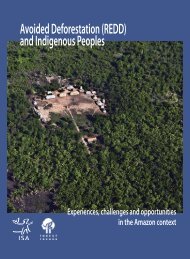BASELINE STUDY 5, Thailand - Forest Trends
BASELINE STUDY 5, Thailand - Forest Trends
BASELINE STUDY 5, Thailand - Forest Trends
You also want an ePaper? Increase the reach of your titles
YUMPU automatically turns print PDFs into web optimized ePapers that Google loves.
The current legal wood system operating in <strong>Thailand</strong> requires the wood industry to follow the following specific<br />
steps:<br />
The origin of wood materials must be documented (e.g., certificate of origin, documents from FIO for<br />
domestic plantation wood);<br />
Clear documentation at customs for import/export (through RFD cooperation);<br />
RFD annual permits to operate lumber processing and wood furniture factories;<br />
Heavy regulation and monitoring of transportation of wood within <strong>Thailand</strong>, relying upon a transportation<br />
pass with wood volumes listed by species to show at highway checkpoints; and<br />
Factories recording and reporting wood manufacturing, among many other regulations.<br />
“National Single Window” is a very new system ready for implementation that enables an online, one-stop service<br />
for all of the steps for wood import/export business. The National Single Window system is based on the<br />
system of COC Guidelines, following the Pan-ASEAN Timber Certification Initiative. The system will track the<br />
entire process of manufacturing the wood product, from the origin of the wood material purchased to selling of<br />
the product, whether for export or domestic consumption. It could also support Timber Legality Assurance System<br />
(TLAS) in the near future.<br />
7.3.1 Issues Related to Cross-Border, “Overland Trade” and Chain of Custody<br />
Overland timber trade, especially with Myanmar, is of continuing concern to Thai authorities, although less so<br />
since the late 1990s when it was much more of a common problem. As a way to minimize the risk of the possibility<br />
of illegally cutting wood in <strong>Thailand</strong>, sending it across the border, and then back again branded as originating<br />
in the neighbouring country (mirroring the “Salween Scandal”), <strong>Thailand</strong> has banned the import of logs or<br />
sawnwood overland. However, with parliamentary approval it can be possible to legally import logs across the<br />
border. Thai law also permits logs to float down the Mekong River for transportation, offering an alternative<br />
legal route for timber traders to transport logs from Laos to <strong>Thailand</strong>. This trade is happening along Chiang Saen<br />
border town in <strong>Thailand</strong>.<br />
Furthermore, there are separate “Committees” (or border business associations) at border towns (Tak, Mae<br />
Hong Son, Rayong, and Sangklaburi) where Myanmar wood products are imported overland. The committees<br />
are composed of customs, RFD, and commerce department officials, and they facilitate business connections<br />
for cross border trade. These border committees now face some problems with some well-connected Thai<br />
businessmen who sometime facilitate the forgery of certificate of origin documents for Myanmar wood products<br />
when an official COO document cannot be produced. While the extent of this has not been systematically<br />
examined, COO forgery is sometimes needed because the timber is often cut by ethnic political resistance<br />
groups within Myanmar, and is not officially sanctioned by the Myanmar government.<br />
Occasionally an outright cross-border trade ban has been implemented by either Thai or Myanmar border authorities<br />
due to political conflict in the vicinity of the official checkpoint. These temporary actions, which usually<br />
only last a few days or weeks, cut off cross-border wood imports. For example, in June 2006 at the Three Pagodas<br />
pass along the Thai-Myanmar border Myanmar authorities banned any cross-border timber flows with<br />
<strong>Thailand</strong> due to insurgent fighting in the area (Sai Silp 2006).<br />
© EU FLEGT Facility, <strong>BASELINE</strong> <strong>STUDY</strong> 5, <strong>Thailand</strong>: Overview of <strong>Forest</strong> Law Enforcement, Governance and Trade, July 2011<br />
This Action is funded by the European Union and the governments of Finland, France, Germany, the Netherlands, Spain and the UK. The views expressed herein<br />
can in no way be taken to reflect the official opinion of the European Union.<br />
www.euflegt.efi.int<br />
46
















